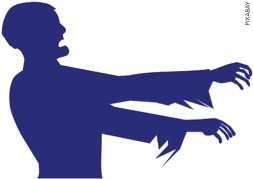A new phenomenon has emerged in British EFL: the zombie language school. It is listed as accredited, and its website suggests that it is open, but it has no premises, no staff, no students, no tangible assets and the company that owns it is no longer trading.
Take the Irish-owned Delfin English School, London. On March 4, Delfin English School (UK) Ltd, went into liquidation, owing £368,297. When we wrote to the British Council with information on possible zombie schools, its only physical presence in the UK seemed to be a serviced office in London.
After we went to press, the DOS of Delfin contacted us. They currently have no school building, but a small team of academic staff are teaching online, employed through another legal entity. We asked the liquidator to inform us if this was a concern but have had no reply.
We apologise to the London Delfin staff, but they were hard to find since the website did not list a UK phone number, email or school address.
We asked the British Council to explain the procedure for a school in liquidation, and a “UK Accreditation spokesperson” replied: “Notification of company liquidation is reviewed by the Executive Board, who may require additional information… before deciding the future of accreditation.”
And when does a school cease to exist?
“A centre ceases to be accredited when the Accreditation UK Executive Board decides there is sufficient evidence to demonstrate they no longer meet the requirements for accreditation,” the spokesperson replied.
Since Mayfair School of English, a stalwart of London’s West End for over 30 years, is still accredited, the Executive Board must have decided it was not a problem when, in September 2019, Mayfair School of English changed its name to TMSOE Ltd and went into liquidation owing £1,571,356.
They must know that the majority shareholder, Mayfair
Education Group Ltd, was dissolved on 4 February this year, and that the school moved to new premises. The website is live, advertising both online and face- to-face courses — although you are advised to “check for availability”. Phone calls go to an answerphone and emails are answered with an automatic reply stating: “We are currently closed for a short break as we prepare for the re-opening of the school under the new UK government guidelines. We will respond to your query as soon as we return.”
Who owns Mayfair School of English? The Executive Board must know, because they state that, “Accreditation cannot be bought or sold; the continuation or transfer of accreditation is not automatic following a change of ownership. Any change of ownership (proprietor, major shareholder, company, holding company) has to be reviewed first.”
Which brings us to the question of who owns Cambridge Academy of English, at 45 years old, one of the UK’s grand old schools, and long an EL Gazette Centre of Excellence. As the website makes clear, it is currently closed and not accepting bookings. Its news page announces that the school building was sold in May.
What it doesn’t say is that on 20 July, having sold the building for more than the value of its debts, the schools’ owners, Kamiya Schools Ltd, part of a Japanese educational trust, appointed a liquidator, issued a certificate of solvency and started winding up the company.
On the same day, three senior members of the school’s staff registered two new companies: a trading company, Willow Education Ltd, and a dormant company, Cambridge Academy of English Ltd. On 13 August, Willow Education applied to trademark the school name.
It looks like a brave attempt by staff to save their school, but the trading name is normally an asset of the company in liquidation and can’t be sold until it is wound up.
We wrote to the liquidator for confirmation that the new company had a right to the name but received no reply.
In the meantime, Cambridge Academy of English remains accredited — but which Cambridge Academy?
All the schools named here have good reputations, and none is soliciting fees from would-be students, but with scores of UK course providers, there may be many zombie schools with no building, no staff and a company on the verge of bankruptcy, but with an online booking platform that continues to take credit card payments.
So, what about the students?
“Accreditation UK is committed to protecting the interests of those coming to study in the UK, at the same time as ensuring the UK ELT sector is given every opportunity to recover from the impact of Covid- 19.”
In the middle of Covid-19 chaos, can you really do both?
Accreditation UK may be the only EFL accreditation scheme left in the world where the school owners’ association is still a partner in the scheme. New Zealand, USA, Australia and Malta all have abandoned the idea, Ireland is planning to.
It may also be the only one which does not check the financial health of the school as part of accreditation. In the middle of a pandemic, that could put students at risk.
UK language schools no longer accredited
In addition to the operations belonging to Instil Education reported on page 7, the following language schools have been removed from the British Council accreditation list since we last reported on changes in July 2020:
Ceased trading
- Bloomsbury International
- Devon School of English
- Global School of English, Edinburgh International House Aberdeen
- Language Gallery, Manchester
- MLS International College, Bournemouth
Sold
- TEG English Bristol
- TEG English Cardiff
- TEG English Portsmouth TEG English Southampton
Still trading, but no longer accredited
- English 2000 School of English
- ILS English, Nottingham
- Leeds School of English
- Moorlands Hall
STOP PRESS
According to local press, Devon School of English is closing.





